Examining Staff Conduct Through Social Cognitive Theory (Bandura 1986)
VerifiedAdded on 2023/01/13
|7
|2007
|64
Essay
AI Summary
This essay examines the factors influencing individual staff conduct through the lens of Albert Bandura's Social Cognitive Theory (1986). It explores the interplay between behavior, environmental factors, and personal characteristics, drawing upon a case study of The Principal Hotel London and its rebranding process. The essay delves into the impact of social context, modeling, and self-efficacy on employee actions, highlighting how factors such as training, company culture, and individual cognition shape behavior within an organizational setting. The analysis considers various cognitive capabilities, including self-regulation, vicarious learning, and symbolic representation, to understand how staff members learn and adapt their behaviors. The study emphasizes the reciprocal nature of these influences and the importance of a supportive environment in fostering positive behavioral changes, ultimately contributing to improved service delivery and organizational growth. The essay concludes by summarizing the key findings, emphasizing the significance of social and environmental factors in shaping individual conduct within the workplace.
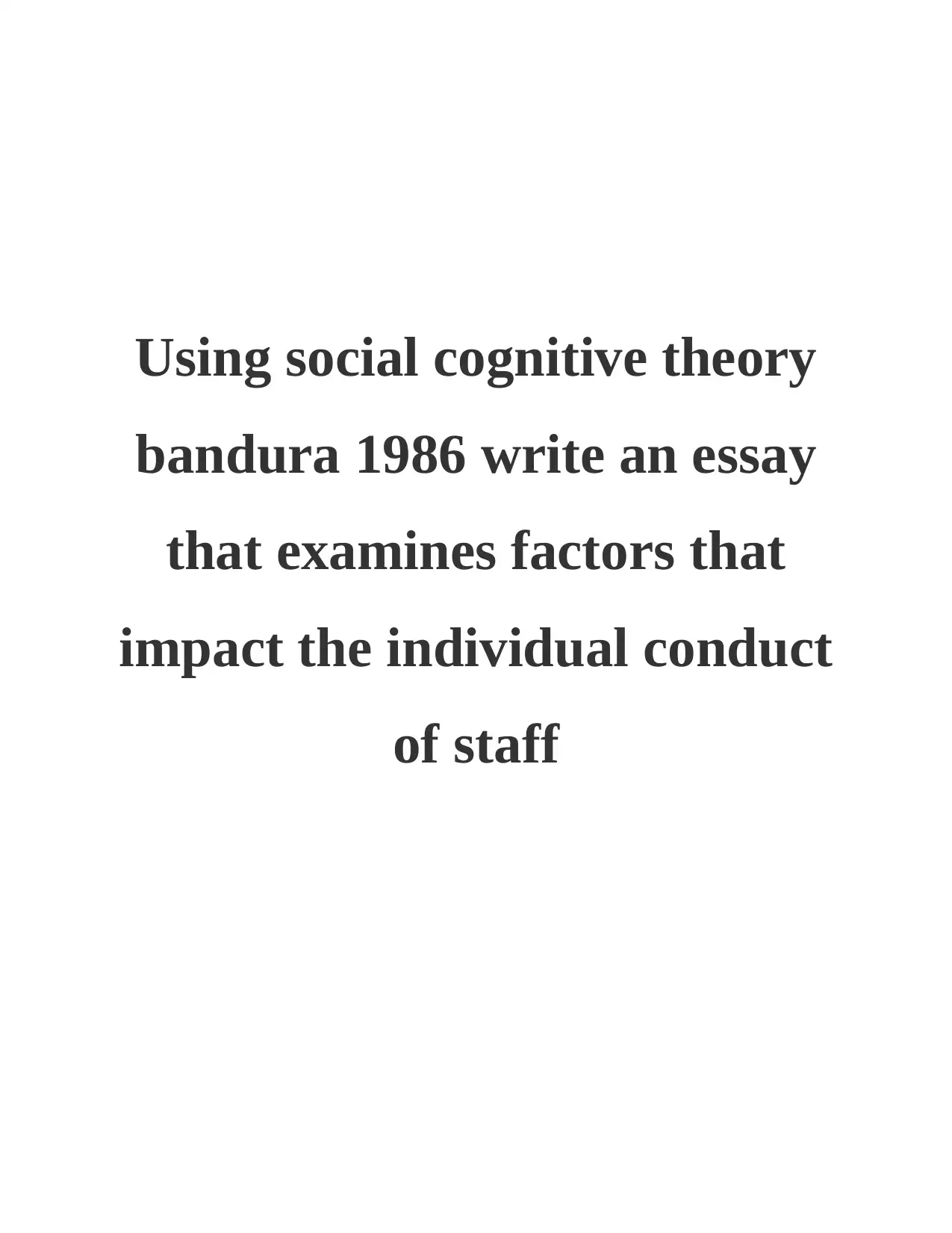
Using social cognitive theory
bandura 1986 write an essay
that examines factors that
impact the individual conduct
of staff
bandura 1986 write an essay
that examines factors that
impact the individual conduct
of staff
Paraphrase This Document
Need a fresh take? Get an instant paraphrase of this document with our AI Paraphraser
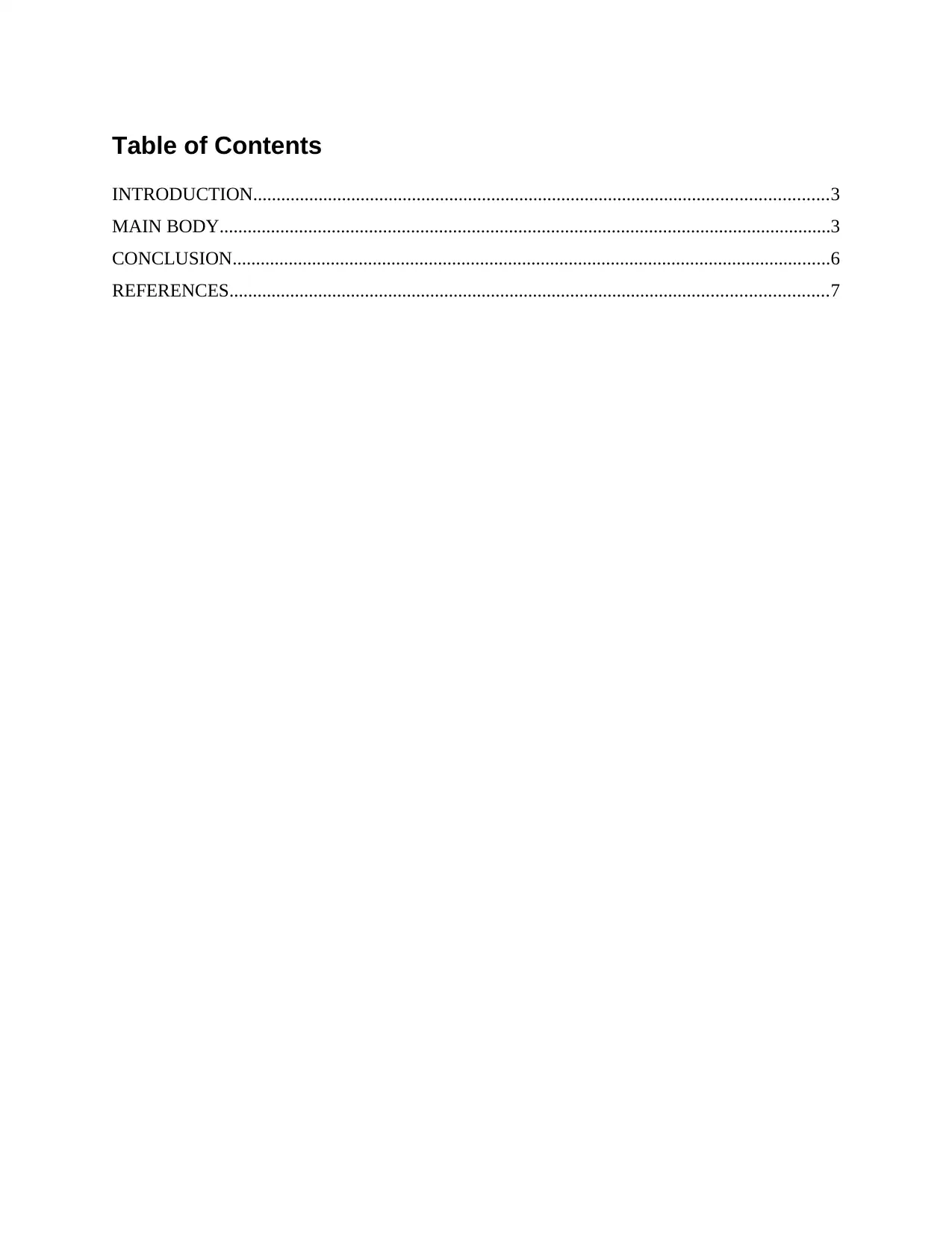
Table of Contents
INTRODUCTION...........................................................................................................................3
MAIN BODY...................................................................................................................................3
CONCLUSION................................................................................................................................6
REFERENCES................................................................................................................................7
INTRODUCTION...........................................................................................................................3
MAIN BODY...................................................................................................................................3
CONCLUSION................................................................................................................................6
REFERENCES................................................................................................................................7
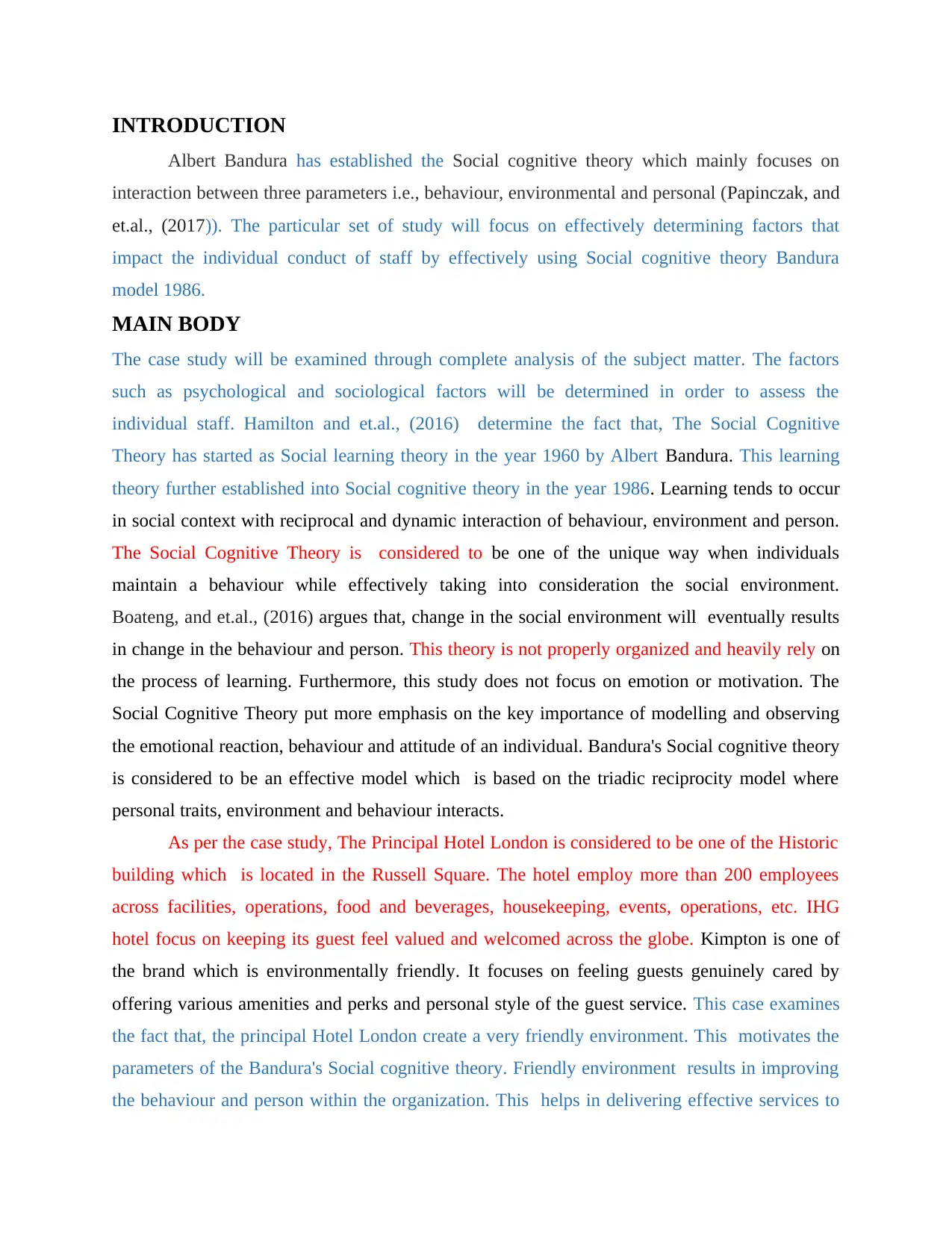
INTRODUCTION
Albert Bandura has established the Social cognitive theory which mainly focuses on
interaction between three parameters i.e., behaviour, environmental and personal (Papinczak, and
et.al., (2017)). The particular set of study will focus on effectively determining factors that
impact the individual conduct of staff by effectively using Social cognitive theory Bandura
model 1986.
MAIN BODY
The case study will be examined through complete analysis of the subject matter. The factors
such as psychological and sociological factors will be determined in order to assess the
individual staff. Hamilton and et.al., (2016) determine the fact that, The Social Cognitive
Theory has started as Social learning theory in the year 1960 by Albert Bandura. This learning
theory further established into Social cognitive theory in the year 1986. Learning tends to occur
in social context with reciprocal and dynamic interaction of behaviour, environment and person.
The Social Cognitive Theory is considered to be one of the unique way when individuals
maintain a behaviour while effectively taking into consideration the social environment.
Boateng, and et.al., (2016) argues that, change in the social environment will eventually results
in change in the behaviour and person. This theory is not properly organized and heavily rely on
the process of learning. Furthermore, this study does not focus on emotion or motivation. The
Social Cognitive Theory put more emphasis on the key importance of modelling and observing
the emotional reaction, behaviour and attitude of an individual. Bandura's Social cognitive theory
is considered to be an effective model which is based on the triadic reciprocity model where
personal traits, environment and behaviour interacts.
As per the case study, The Principal Hotel London is considered to be one of the Historic
building which is located in the Russell Square. The hotel employ more than 200 employees
across facilities, operations, food and beverages, housekeeping, events, operations, etc. IHG
hotel focus on keeping its guest feel valued and welcomed across the globe. Kimpton is one of
the brand which is environmentally friendly. It focuses on feeling guests genuinely cared by
offering various amenities and perks and personal style of the guest service. This case examines
the fact that, the principal Hotel London create a very friendly environment. This motivates the
parameters of the Bandura's Social cognitive theory. Friendly environment results in improving
the behaviour and person within the organization. This helps in delivering effective services to
Albert Bandura has established the Social cognitive theory which mainly focuses on
interaction between three parameters i.e., behaviour, environmental and personal (Papinczak, and
et.al., (2017)). The particular set of study will focus on effectively determining factors that
impact the individual conduct of staff by effectively using Social cognitive theory Bandura
model 1986.
MAIN BODY
The case study will be examined through complete analysis of the subject matter. The factors
such as psychological and sociological factors will be determined in order to assess the
individual staff. Hamilton and et.al., (2016) determine the fact that, The Social Cognitive
Theory has started as Social learning theory in the year 1960 by Albert Bandura. This learning
theory further established into Social cognitive theory in the year 1986. Learning tends to occur
in social context with reciprocal and dynamic interaction of behaviour, environment and person.
The Social Cognitive Theory is considered to be one of the unique way when individuals
maintain a behaviour while effectively taking into consideration the social environment.
Boateng, and et.al., (2016) argues that, change in the social environment will eventually results
in change in the behaviour and person. This theory is not properly organized and heavily rely on
the process of learning. Furthermore, this study does not focus on emotion or motivation. The
Social Cognitive Theory put more emphasis on the key importance of modelling and observing
the emotional reaction, behaviour and attitude of an individual. Bandura's Social cognitive theory
is considered to be an effective model which is based on the triadic reciprocity model where
personal traits, environment and behaviour interacts.
As per the case study, The Principal Hotel London is considered to be one of the Historic
building which is located in the Russell Square. The hotel employ more than 200 employees
across facilities, operations, food and beverages, housekeeping, events, operations, etc. IHG
hotel focus on keeping its guest feel valued and welcomed across the globe. Kimpton is one of
the brand which is environmentally friendly. It focuses on feeling guests genuinely cared by
offering various amenities and perks and personal style of the guest service. This case examines
the fact that, the principal Hotel London create a very friendly environment. This motivates the
parameters of the Bandura's Social cognitive theory. Friendly environment results in improving
the behaviour and person within the organization. This helps in delivering effective services to
⊘ This is a preview!⊘
Do you want full access?
Subscribe today to unlock all pages.

Trusted by 1+ million students worldwide
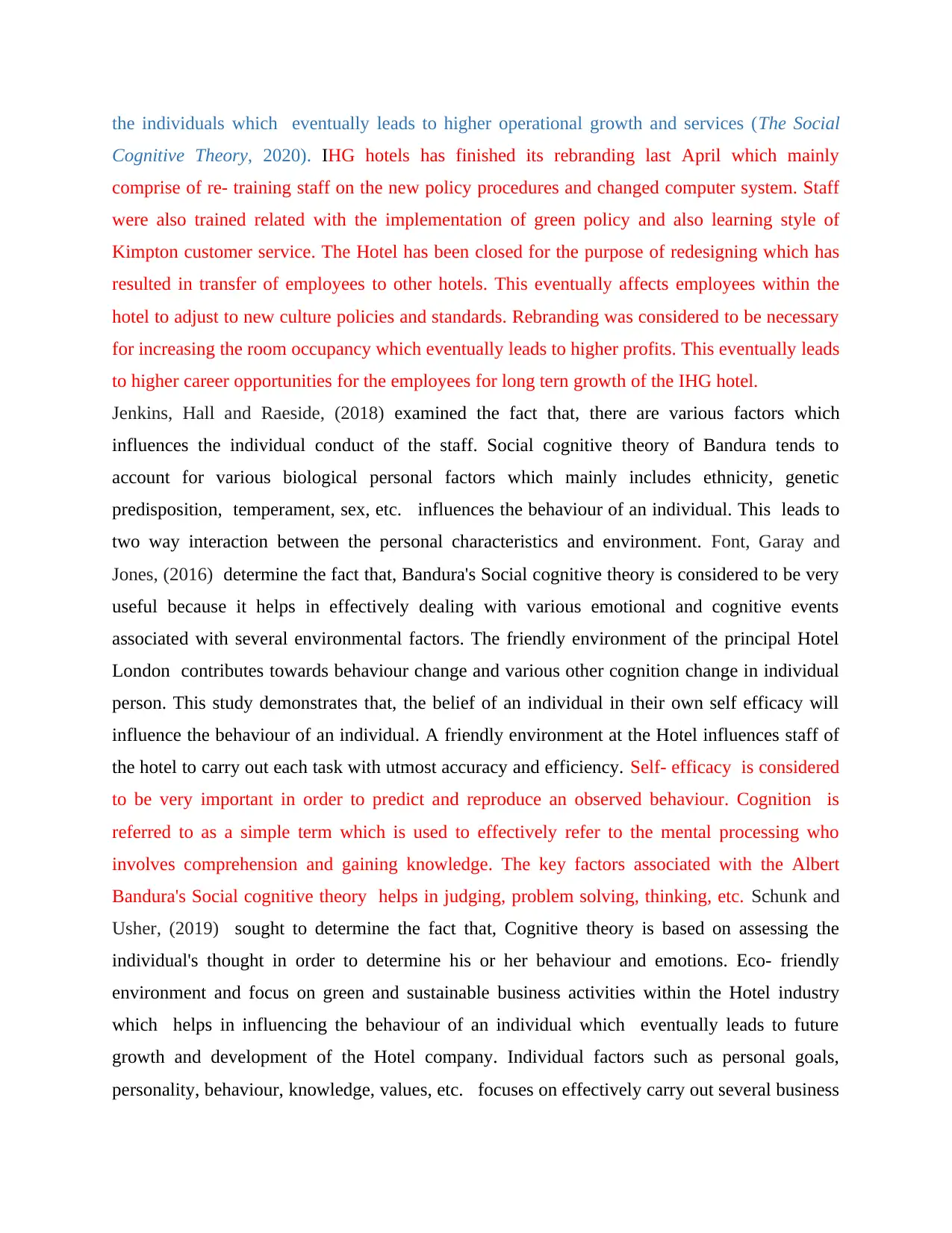
the individuals which eventually leads to higher operational growth and services (The Social
Cognitive Theory, 2020). IHG hotels has finished its rebranding last April which mainly
comprise of re- training staff on the new policy procedures and changed computer system. Staff
were also trained related with the implementation of green policy and also learning style of
Kimpton customer service. The Hotel has been closed for the purpose of redesigning which has
resulted in transfer of employees to other hotels. This eventually affects employees within the
hotel to adjust to new culture policies and standards. Rebranding was considered to be necessary
for increasing the room occupancy which eventually leads to higher profits. This eventually leads
to higher career opportunities for the employees for long tern growth of the IHG hotel.
Jenkins, Hall and Raeside, (2018) examined the fact that, there are various factors which
influences the individual conduct of the staff. Social cognitive theory of Bandura tends to
account for various biological personal factors which mainly includes ethnicity, genetic
predisposition, temperament, sex, etc. influences the behaviour of an individual. This leads to
two way interaction between the personal characteristics and environment. Font, Garay and
Jones, (2016) determine the fact that, Bandura's Social cognitive theory is considered to be very
useful because it helps in effectively dealing with various emotional and cognitive events
associated with several environmental factors. The friendly environment of the principal Hotel
London contributes towards behaviour change and various other cognition change in individual
person. This study demonstrates that, the belief of an individual in their own self efficacy will
influence the behaviour of an individual. A friendly environment at the Hotel influences staff of
the hotel to carry out each task with utmost accuracy and efficiency. Self- efficacy is considered
to be very important in order to predict and reproduce an observed behaviour. Cognition is
referred to as a simple term which is used to effectively refer to the mental processing who
involves comprehension and gaining knowledge. The key factors associated with the Albert
Bandura's Social cognitive theory helps in judging, problem solving, thinking, etc. Schunk and
Usher, (2019) sought to determine the fact that, Cognitive theory is based on assessing the
individual's thought in order to determine his or her behaviour and emotions. Eco- friendly
environment and focus on green and sustainable business activities within the Hotel industry
which helps in influencing the behaviour of an individual which eventually leads to future
growth and development of the Hotel company. Individual factors such as personal goals,
personality, behaviour, knowledge, values, etc. focuses on effectively carry out several business
Cognitive Theory, 2020). IHG hotels has finished its rebranding last April which mainly
comprise of re- training staff on the new policy procedures and changed computer system. Staff
were also trained related with the implementation of green policy and also learning style of
Kimpton customer service. The Hotel has been closed for the purpose of redesigning which has
resulted in transfer of employees to other hotels. This eventually affects employees within the
hotel to adjust to new culture policies and standards. Rebranding was considered to be necessary
for increasing the room occupancy which eventually leads to higher profits. This eventually leads
to higher career opportunities for the employees for long tern growth of the IHG hotel.
Jenkins, Hall and Raeside, (2018) examined the fact that, there are various factors which
influences the individual conduct of the staff. Social cognitive theory of Bandura tends to
account for various biological personal factors which mainly includes ethnicity, genetic
predisposition, temperament, sex, etc. influences the behaviour of an individual. This leads to
two way interaction between the personal characteristics and environment. Font, Garay and
Jones, (2016) determine the fact that, Bandura's Social cognitive theory is considered to be very
useful because it helps in effectively dealing with various emotional and cognitive events
associated with several environmental factors. The friendly environment of the principal Hotel
London contributes towards behaviour change and various other cognition change in individual
person. This study demonstrates that, the belief of an individual in their own self efficacy will
influence the behaviour of an individual. A friendly environment at the Hotel influences staff of
the hotel to carry out each task with utmost accuracy and efficiency. Self- efficacy is considered
to be very important in order to predict and reproduce an observed behaviour. Cognition is
referred to as a simple term which is used to effectively refer to the mental processing who
involves comprehension and gaining knowledge. The key factors associated with the Albert
Bandura's Social cognitive theory helps in judging, problem solving, thinking, etc. Schunk and
Usher, (2019) sought to determine the fact that, Cognitive theory is based on assessing the
individual's thought in order to determine his or her behaviour and emotions. Eco- friendly
environment and focus on green and sustainable business activities within the Hotel industry
which helps in influencing the behaviour of an individual which eventually leads to future
growth and development of the Hotel company. Individual factors such as personal goals,
personality, behaviour, knowledge, values, etc. focuses on effectively carry out several business
Paraphrase This Document
Need a fresh take? Get an instant paraphrase of this document with our AI Paraphraser
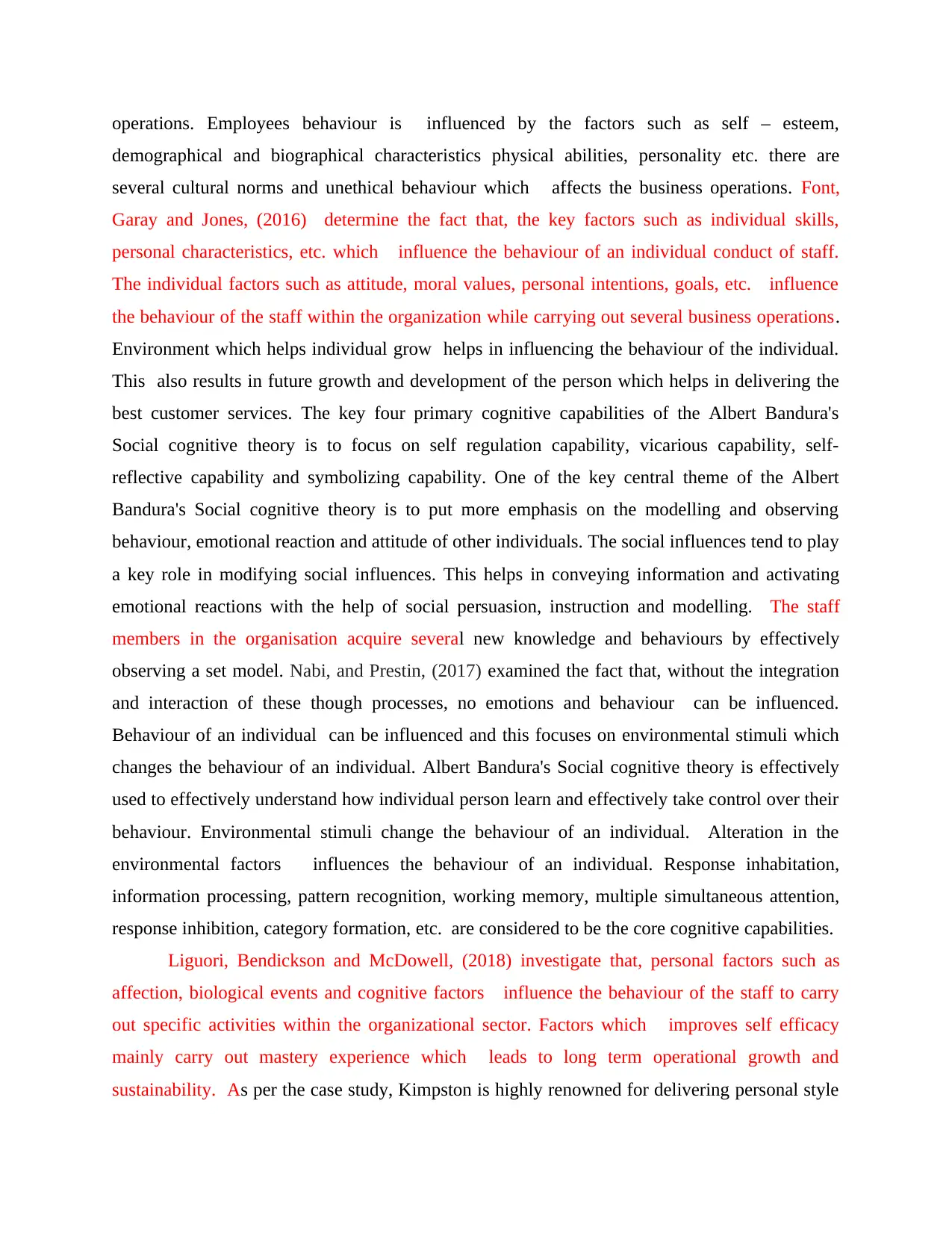
operations. Employees behaviour is influenced by the factors such as self – esteem,
demographical and biographical characteristics physical abilities, personality etc. there are
several cultural norms and unethical behaviour which affects the business operations. Font,
Garay and Jones, (2016) determine the fact that, the key factors such as individual skills,
personal characteristics, etc. which influence the behaviour of an individual conduct of staff.
The individual factors such as attitude, moral values, personal intentions, goals, etc. influence
the behaviour of the staff within the organization while carrying out several business operations.
Environment which helps individual grow helps in influencing the behaviour of the individual.
This also results in future growth and development of the person which helps in delivering the
best customer services. The key four primary cognitive capabilities of the Albert Bandura's
Social cognitive theory is to focus on self regulation capability, vicarious capability, self-
reflective capability and symbolizing capability. One of the key central theme of the Albert
Bandura's Social cognitive theory is to put more emphasis on the modelling and observing
behaviour, emotional reaction and attitude of other individuals. The social influences tend to play
a key role in modifying social influences. This helps in conveying information and activating
emotional reactions with the help of social persuasion, instruction and modelling. The staff
members in the organisation acquire several new knowledge and behaviours by effectively
observing a set model. Nabi, and Prestin, (2017) examined the fact that, without the integration
and interaction of these though processes, no emotions and behaviour can be influenced.
Behaviour of an individual can be influenced and this focuses on environmental stimuli which
changes the behaviour of an individual. Albert Bandura's Social cognitive theory is effectively
used to effectively understand how individual person learn and effectively take control over their
behaviour. Environmental stimuli change the behaviour of an individual. Alteration in the
environmental factors influences the behaviour of an individual. Response inhabitation,
information processing, pattern recognition, working memory, multiple simultaneous attention,
response inhibition, category formation, etc. are considered to be the core cognitive capabilities.
Liguori, Bendickson and McDowell, (2018) investigate that, personal factors such as
affection, biological events and cognitive factors influence the behaviour of the staff to carry
out specific activities within the organizational sector. Factors which improves self efficacy
mainly carry out mastery experience which leads to long term operational growth and
sustainability. As per the case study, Kimpston is highly renowned for delivering personal style
demographical and biographical characteristics physical abilities, personality etc. there are
several cultural norms and unethical behaviour which affects the business operations. Font,
Garay and Jones, (2016) determine the fact that, the key factors such as individual skills,
personal characteristics, etc. which influence the behaviour of an individual conduct of staff.
The individual factors such as attitude, moral values, personal intentions, goals, etc. influence
the behaviour of the staff within the organization while carrying out several business operations.
Environment which helps individual grow helps in influencing the behaviour of the individual.
This also results in future growth and development of the person which helps in delivering the
best customer services. The key four primary cognitive capabilities of the Albert Bandura's
Social cognitive theory is to focus on self regulation capability, vicarious capability, self-
reflective capability and symbolizing capability. One of the key central theme of the Albert
Bandura's Social cognitive theory is to put more emphasis on the modelling and observing
behaviour, emotional reaction and attitude of other individuals. The social influences tend to play
a key role in modifying social influences. This helps in conveying information and activating
emotional reactions with the help of social persuasion, instruction and modelling. The staff
members in the organisation acquire several new knowledge and behaviours by effectively
observing a set model. Nabi, and Prestin, (2017) examined the fact that, without the integration
and interaction of these though processes, no emotions and behaviour can be influenced.
Behaviour of an individual can be influenced and this focuses on environmental stimuli which
changes the behaviour of an individual. Albert Bandura's Social cognitive theory is effectively
used to effectively understand how individual person learn and effectively take control over their
behaviour. Environmental stimuli change the behaviour of an individual. Alteration in the
environmental factors influences the behaviour of an individual. Response inhabitation,
information processing, pattern recognition, working memory, multiple simultaneous attention,
response inhibition, category formation, etc. are considered to be the core cognitive capabilities.
Liguori, Bendickson and McDowell, (2018) investigate that, personal factors such as
affection, biological events and cognitive factors influence the behaviour of the staff to carry
out specific activities within the organizational sector. Factors which improves self efficacy
mainly carry out mastery experience which leads to long term operational growth and
sustainability. As per the case study, Kimpston is highly renowned for delivering personal style
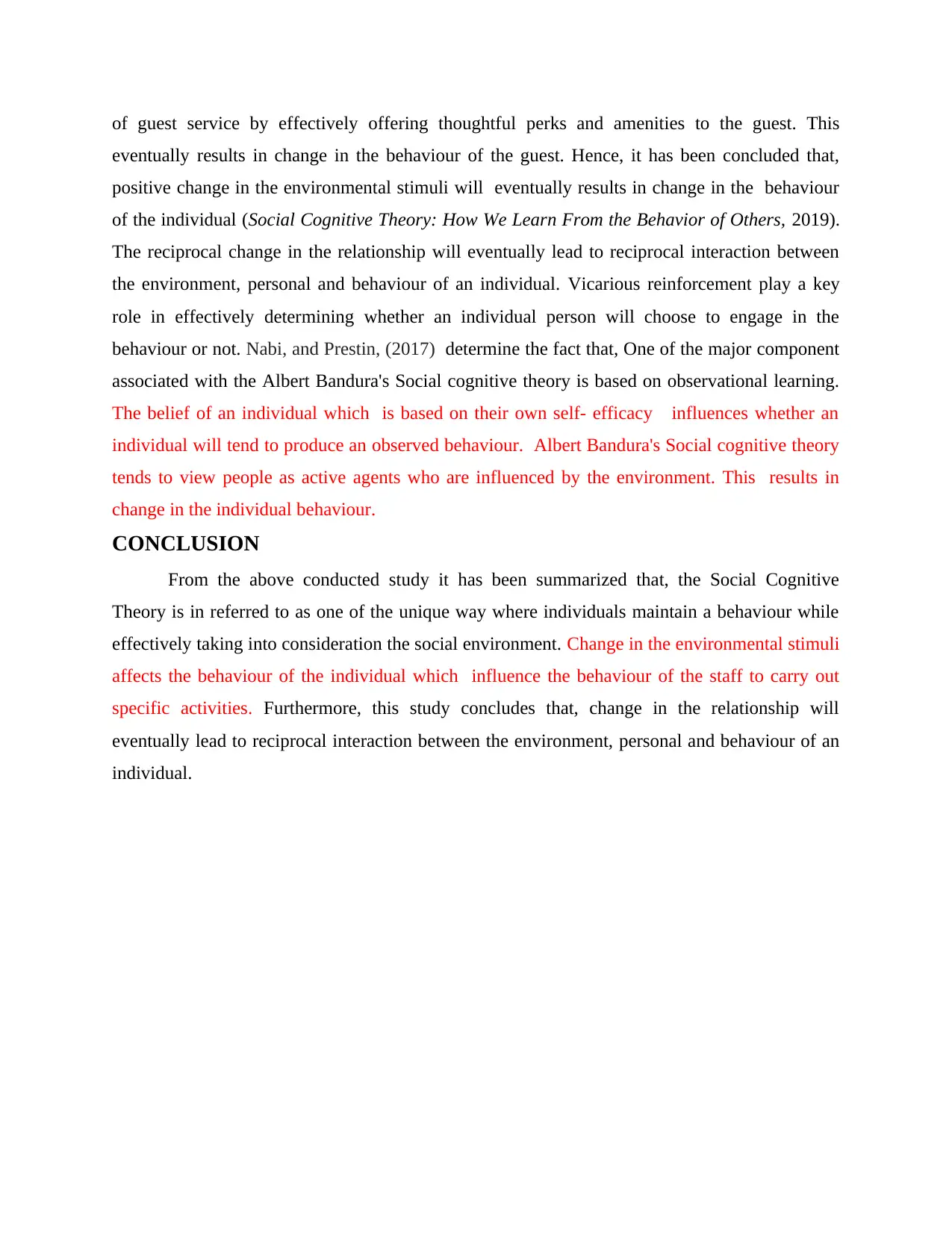
of guest service by effectively offering thoughtful perks and amenities to the guest. This
eventually results in change in the behaviour of the guest. Hence, it has been concluded that,
positive change in the environmental stimuli will eventually results in change in the behaviour
of the individual (Social Cognitive Theory: How We Learn From the Behavior of Others, 2019).
The reciprocal change in the relationship will eventually lead to reciprocal interaction between
the environment, personal and behaviour of an individual. Vicarious reinforcement play a key
role in effectively determining whether an individual person will choose to engage in the
behaviour or not. Nabi, and Prestin, (2017) determine the fact that, One of the major component
associated with the Albert Bandura's Social cognitive theory is based on observational learning.
The belief of an individual which is based on their own self- efficacy influences whether an
individual will tend to produce an observed behaviour. Albert Bandura's Social cognitive theory
tends to view people as active agents who are influenced by the environment. This results in
change in the individual behaviour.
CONCLUSION
From the above conducted study it has been summarized that, the Social Cognitive
Theory is in referred to as one of the unique way where individuals maintain a behaviour while
effectively taking into consideration the social environment. Change in the environmental stimuli
affects the behaviour of the individual which influence the behaviour of the staff to carry out
specific activities. Furthermore, this study concludes that, change in the relationship will
eventually lead to reciprocal interaction between the environment, personal and behaviour of an
individual.
eventually results in change in the behaviour of the guest. Hence, it has been concluded that,
positive change in the environmental stimuli will eventually results in change in the behaviour
of the individual (Social Cognitive Theory: How We Learn From the Behavior of Others, 2019).
The reciprocal change in the relationship will eventually lead to reciprocal interaction between
the environment, personal and behaviour of an individual. Vicarious reinforcement play a key
role in effectively determining whether an individual person will choose to engage in the
behaviour or not. Nabi, and Prestin, (2017) determine the fact that, One of the major component
associated with the Albert Bandura's Social cognitive theory is based on observational learning.
The belief of an individual which is based on their own self- efficacy influences whether an
individual will tend to produce an observed behaviour. Albert Bandura's Social cognitive theory
tends to view people as active agents who are influenced by the environment. This results in
change in the individual behaviour.
CONCLUSION
From the above conducted study it has been summarized that, the Social Cognitive
Theory is in referred to as one of the unique way where individuals maintain a behaviour while
effectively taking into consideration the social environment. Change in the environmental stimuli
affects the behaviour of the individual which influence the behaviour of the staff to carry out
specific activities. Furthermore, this study concludes that, change in the relationship will
eventually lead to reciprocal interaction between the environment, personal and behaviour of an
individual.
⊘ This is a preview!⊘
Do you want full access?
Subscribe today to unlock all pages.

Trusted by 1+ million students worldwide
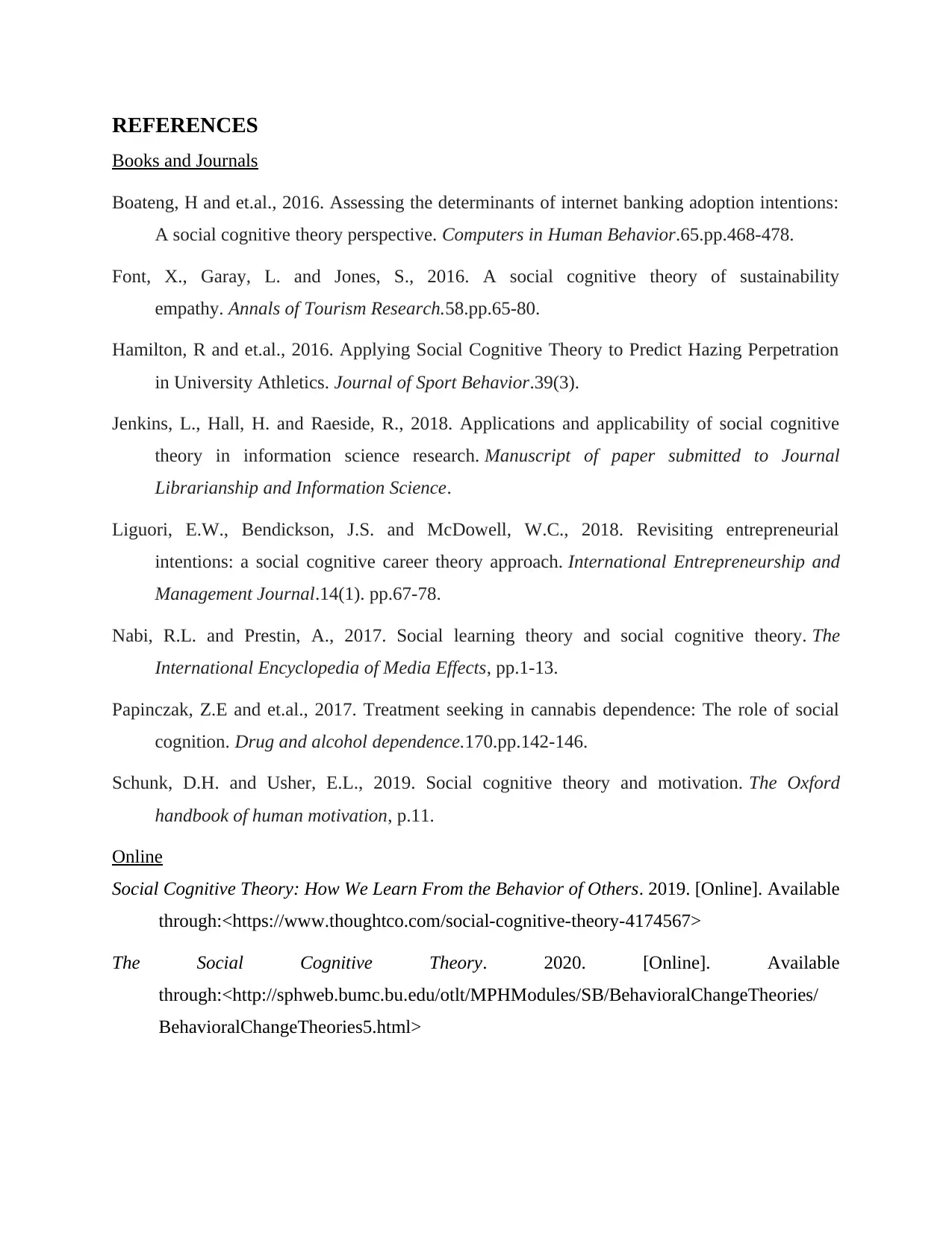
REFERENCES
Books and Journals
Boateng, H and et.al., 2016. Assessing the determinants of internet banking adoption intentions:
A social cognitive theory perspective. Computers in Human Behavior.65.pp.468-478.
Font, X., Garay, L. and Jones, S., 2016. A social cognitive theory of sustainability
empathy. Annals of Tourism Research.58.pp.65-80.
Hamilton, R and et.al., 2016. Applying Social Cognitive Theory to Predict Hazing Perpetration
in University Athletics. Journal of Sport Behavior.39(3).
Jenkins, L., Hall, H. and Raeside, R., 2018. Applications and applicability of social cognitive
theory in information science research. Manuscript of paper submitted to Journal
Librarianship and Information Science.
Liguori, E.W., Bendickson, J.S. and McDowell, W.C., 2018. Revisiting entrepreneurial
intentions: a social cognitive career theory approach. International Entrepreneurship and
Management Journal.14(1). pp.67-78.
Nabi, R.L. and Prestin, A., 2017. Social learning theory and social cognitive theory. The
International Encyclopedia of Media Effects, pp.1-13.
Papinczak, Z.E and et.al., 2017. Treatment seeking in cannabis dependence: The role of social
cognition. Drug and alcohol dependence.170.pp.142-146.
Schunk, D.H. and Usher, E.L., 2019. Social cognitive theory and motivation. The Oxford
handbook of human motivation, p.11.
Online
Social Cognitive Theory: How We Learn From the Behavior of Others. 2019. [Online]. Available
through:<https://www.thoughtco.com/social-cognitive-theory-4174567>
The Social Cognitive Theory. 2020. [Online]. Available
through:<http://sphweb.bumc.bu.edu/otlt/MPHModules/SB/BehavioralChangeTheories/
BehavioralChangeTheories5.html>
Books and Journals
Boateng, H and et.al., 2016. Assessing the determinants of internet banking adoption intentions:
A social cognitive theory perspective. Computers in Human Behavior.65.pp.468-478.
Font, X., Garay, L. and Jones, S., 2016. A social cognitive theory of sustainability
empathy. Annals of Tourism Research.58.pp.65-80.
Hamilton, R and et.al., 2016. Applying Social Cognitive Theory to Predict Hazing Perpetration
in University Athletics. Journal of Sport Behavior.39(3).
Jenkins, L., Hall, H. and Raeside, R., 2018. Applications and applicability of social cognitive
theory in information science research. Manuscript of paper submitted to Journal
Librarianship and Information Science.
Liguori, E.W., Bendickson, J.S. and McDowell, W.C., 2018. Revisiting entrepreneurial
intentions: a social cognitive career theory approach. International Entrepreneurship and
Management Journal.14(1). pp.67-78.
Nabi, R.L. and Prestin, A., 2017. Social learning theory and social cognitive theory. The
International Encyclopedia of Media Effects, pp.1-13.
Papinczak, Z.E and et.al., 2017. Treatment seeking in cannabis dependence: The role of social
cognition. Drug and alcohol dependence.170.pp.142-146.
Schunk, D.H. and Usher, E.L., 2019. Social cognitive theory and motivation. The Oxford
handbook of human motivation, p.11.
Online
Social Cognitive Theory: How We Learn From the Behavior of Others. 2019. [Online]. Available
through:<https://www.thoughtco.com/social-cognitive-theory-4174567>
The Social Cognitive Theory. 2020. [Online]. Available
through:<http://sphweb.bumc.bu.edu/otlt/MPHModules/SB/BehavioralChangeTheories/
BehavioralChangeTheories5.html>
1 out of 7
Related Documents
Your All-in-One AI-Powered Toolkit for Academic Success.
+13062052269
info@desklib.com
Available 24*7 on WhatsApp / Email
![[object Object]](/_next/static/media/star-bottom.7253800d.svg)
Unlock your academic potential
Copyright © 2020–2026 A2Z Services. All Rights Reserved. Developed and managed by ZUCOL.





